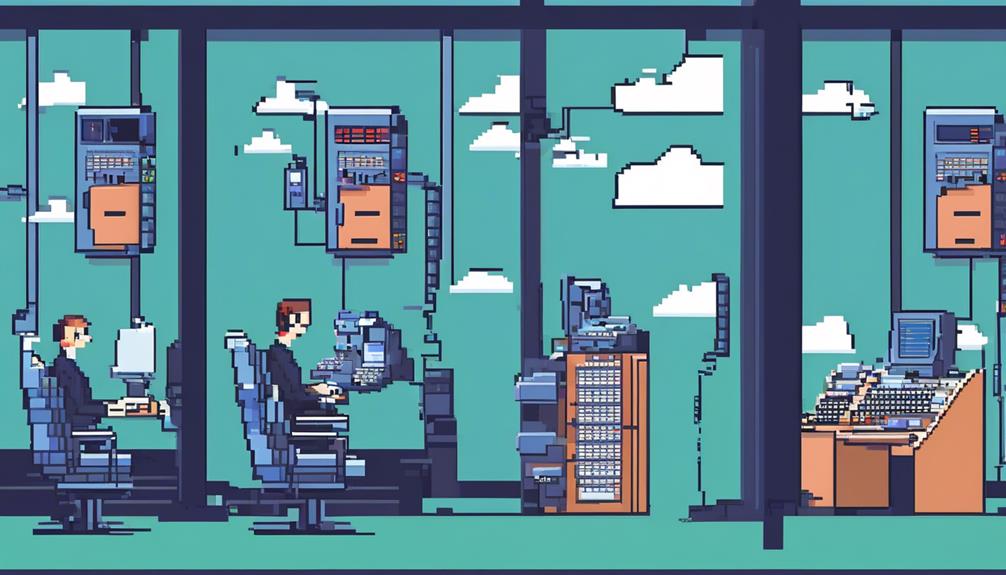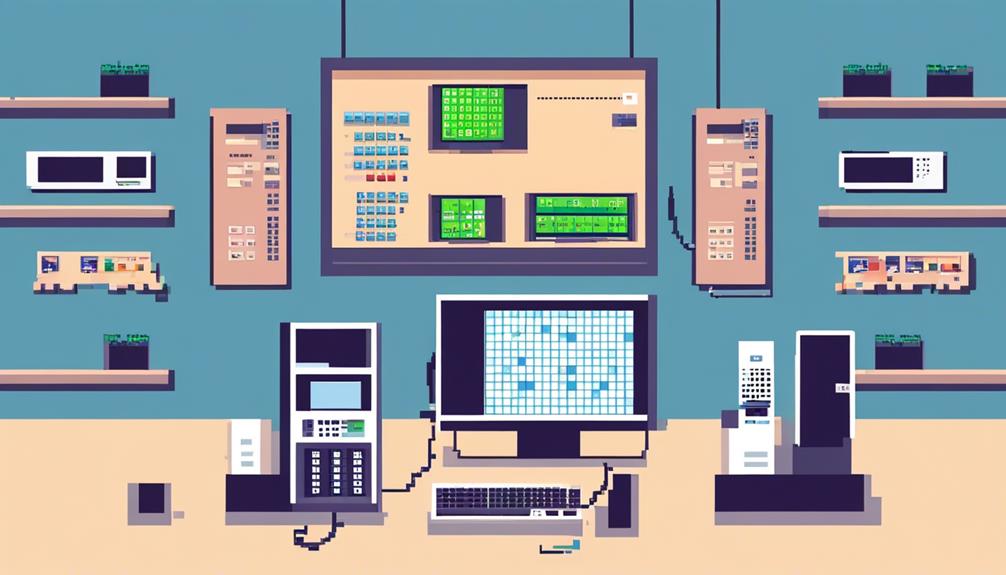When it comes to phone systems for businesses, PBX and VoIP are two commonly used options. While they both serve the purpose of facilitating communication within an organization, there are distinct differences between the two.
PBX, or Private Branch Exchange, functions as a private telephone network that connects desk phones within an office, enabling internal calls and call transfers using extensions.
On the other hand, VoIP, which stands for Voice over Internet Protocol, is a technology that transmits voice data over the internet. Instead of relying on traditional phone lines, VoIP phones convert voice into data packets and send them to the VoIP provider. This eliminates the need for a physical PBX system.
In this discussion, we will explore the key differences between PBX and VoIP, including functionality, cost, call quality, scalability, flexibility, and security considerations. By the end, you will have a clearer understanding of which system is best suited for your business needs.
Key Takeaways
- PBX is a traditional on-site telephone network, while VoIP is a cloud-based alternative offered by VoIP providers.
- PBX uses hardware and physical phone lines for data transmission, while VoIP transmits voice data over the internet using a broadband connection.
- PBX restricts phone usage to the office, while VoIP allows calls from anywhere with internet access.
- VoIP generally has lower upfront costs and offers cost savings compared to PBX, with up to 60% lower business landline costs.
PBX System Basics

- What are the fundamental principles of a PBX system?
A PBX, or Private Branch Exchange, is a business phone system that enables internal communication and call transfers using extensions. It allows organizations to have more phones than physical phone lines, thereby increasing efficiency and reducing costs.
- Traditional PBX systems require on-site installation and maintenance, while hosted PBX systems are cloud-based alternatives offered by VoIP providers. Hosted PBX systems eliminate the need for on-site hardware and provide businesses with flexibility and scalability.
- PBX systems can function using different technologies. For instance, a traditional PBX system may convert digital signals on-site and use phone lines connected to the Public Switched Telephone Network (PSTN). On the other hand, a VoIP PBX system transfers calls over the internet, using Voice over Internet Protocol (VoIP) to send digital call data to the VoIP provider. This technology allows businesses to leverage advanced features and cost-effective calling rates.
- VoIP, in itself, is a technology that enables voice data transmission over the internet. It offers businesses the flexibility to communicate using only an internet connection and a VoIP phone, eliminating the need for a physical PBX system.
- However, existing PBX systems can also integrate with VoIP by adopting a hosted PBX solution. This allows businesses to handle calls using the VoIP infrastructure while still leveraging their existing PBX system.
Key Differences in Functionality
One notable distinction in functionality between PBX and VoIP systems lies in their approach to data transmission and the flexibility they offer to users. PBX, or Private Branch Exchange, is a traditional phone system that connects office desk phones on the same network. It relies on hardware and physical phone lines to transmit voice data. On the other hand, VoIP, or Voice over Internet Protocol, transmits voice data over the internet using a broadband internet connection. This key difference allows for greater flexibility and mobility with VoIP systems, as calls can be made and received from computers or mobile phones, enabling remote work and handling calls outside the office.
To further illustrate the differences between PBX and VoIP systems, let's take a look at the following table:
| Functionality | PBX | VoIP |
|---|---|---|
| Data Transmission | Traditional hardware | Internet connection |
| Phone Usage | Restricted to office | Anywhere with internet access |
| Upfront Costs | Large investment | Lower upfront costs |
| Scalability | Adding phone lines | Adding more phones |
| Maintenance | On-site servicing | Provider maintains hardware |
| Advanced Features | Limited customization | More advanced features |
As shown in the table, PBX systems require a significant upfront investment for on-site installation and are limited in terms of scalability and customization. VoIP, on the other hand, offers lower upfront costs and follows a subscription model for running costs. It allows for rapid scalability by adding more phones and users, while also providing more advanced features and customization options compared to PBX.
Cost Comparison: PBX Vs. Voip

When comparing the costs associated with PBX and VoIP systems, it is evident that there are significant differences in terms of upfront investments and running costs.
On-site PBX installations require a substantial upfront investment, including hardware such as power supply, routers, and VoIP gateways. In contrast, VoIP generally has lower upfront costs as it utilizes existing internet infrastructure for communication.
VoIP providers typically follow a subscription model, offering plans starting at $17.95 per month per user. This subscription covers the cost of using the VoIP phone system, including maintenance, updates, and technical support. On the other hand, PBX running costs depend on the specific setup, including software licenses and maintenance fees.
In terms of overall cost savings, VoIP has a clear advantage over PBX. Business landline costs can be up to 60% more expensive than VoIP, making VoIP the more affordable option. Additionally, VoIP allows for rapid scalability in call center technology. Expanding businesses can easily add more users without the need for additional phone lines or hardware installation, making VoIP more cost-effective for growth.
Furthermore, VoIP offers a flexible solution for businesses of all sizes. Most PBX features can be provided by VoIP systems without the need for on-site PBX hardware. Existing PBX systems can also implement a cloud-based PBX to leverage VoIP for handling calls. This flexibility allows businesses to transition to VoIP networks seamlessly, reducing costs and enhancing call quality.
Call Quality and Reliability
Call quality and reliability are crucial factors to consider when comparing PBX and VoIP systems. Both systems have their own unique characteristics that impact call quality and reliability. Here are three key points to understand about call quality and reliability in PBX and VoIP systems:
- Dependence on Bandwidth and Network Configuration:
- VoIP call quality is highly dependent on the available bandwidth and network configuration.
- Insufficient bandwidth or network congestion can result in poor call quality, such as dropped calls or choppy audio.
- On the other hand, PBX systems use the traditional Public Switched Telephone Network (PSTN), which generally provides reliable call quality regardless of network conditions.
- Maintenance and Reliability:
- VoIP providers maintain the necessary hardware and infrastructure to ensure reliable service.
- They constantly monitor and update their systems to minimize downtime and ensure high call quality.
- In contrast, PBX systems require on-site maintenance and may experience downtime if there are hardware failures or technical issues.
- Flexibility and HD Voice Calls:
- VoIP phone systems offer flexibility for team mobility, allowing calls to be made and received from computers and mobile phones.
- This flexibility enables seamless communication, even when team members are not physically present in the office.
- Additionally, VoIP offers the potential for HD voice calls, providing superior audio quality compared to traditional phone systems.
When considering call quality and reliability, it is important to understand the differences between PBX and VoIP systems. While PBX relies on the PSTN for reliable service, VoIP offers greater flexibility and the potential for higher call quality with the right network setup and bandwidth provisions. Ultimately, the choice between PBX and VoIP will depend on the specific needs and priorities of your business.
Scalability and Flexibility

To further explore the comparison between PBX and VoIP systems, we will now examine the subtopic of scalability and flexibility, two essential factors that contribute to the adaptability of these communication solutions.
When it comes to scalability, VoIP has a clear advantage. With VoIP, businesses can rapidly add more phones and users as their needs grow, making it a flexible option for businesses of all sizes. In contrast, PBX systems may require additional hardware and infrastructure upgrades to accommodate expansion, which can be time-consuming and costly.
Moreover, VoIP can be used effectively without a PBX system in place, offering businesses the flexibility to implement it as needed. VoIP providers can offer most PBX features without the need for on-site PBX hardware, providing scalability and flexibility for businesses. This means that adding more VoIP phones and users is straightforward, making VoIP more scalable than PBX for expanding businesses.
To support the scalability of VoIP, businesses may need to upgrade their broadband internet or add a network switch. These adjustments showcase the flexibility of VoIP in meeting the evolving needs of businesses. In addition, VoIP offers advanced features like call routing and SIP trunking, which further enhance its scalability and flexibility.
Security Considerations
Security is a paramount concern for both PBX and VoIP systems, requiring robust measures to protect against unauthorized access, fraud, eavesdropping, call tampering, and service theft. Here are three key security considerations for both PBX and VoIP systems:
- Authentication: Both PBX and VoIP systems need strong authentication methods to secure user access. This ensures that only authorized individuals can make or receive calls. PBX systems often use PIN codes or passwords, while VoIP systems can leverage secure protocols like SIP over Transport Layer Security (TLS) for user authentication.
- Encryption: VoIP systems should use encryption to protect voice data and prevent interception. By encrypting the voice packets, it becomes much more difficult for hackers to eavesdrop on conversations or tamper with the call content. Secure Real-time Transport Protocol (SRTP) is a commonly used encryption protocol for VoIP communications.
- Regular Security Audits and Updates: Both PBX and VoIP systems should undergo regular security audits to identify and address any vulnerabilities. It is crucial to keep software and firmware up to date, as updates often include security patches that protect against newly discovered threats. Regular audits and updates help mitigate the risk of hackers attacking the system and ensure that security measures remain effective over time.
Choosing the Right System for Your Business

With the security considerations addressed, the next step is to carefully choose the system that best suits your business needs. When choosing between PBX and VoIP, there are several factors to consider.
Firstly, assess the initial setup costs and hardware investment required for each system. PBX typically requires purchasing and maintaining hardware, while VoIP operates primarily through software, reducing upfront costs and hardware requirements.
Next, evaluate the running costs and pricing models. VoIP often follows a subscription-based model, offering cost savings compared to PBX, which may have additional charges for maintenance and upgrades.
Consider the call quality and reliability of both systems. With proper setup and a reliable service provider, both PBX and VoIP can provide high-quality calls. Look for service providers that offer robust network infrastructure and prioritize call quality.
Scalability is another crucial consideration. VoIP solutions are generally more scalable, allowing for easy expansion as your business grows. PBX may require additional hardware and phone lines to accommodate a larger number of users.
Also, assess the mobility and flexibility each system offers. VoIP solutions provide greater flexibility for remote work and team mobility, as they can be accessed from any location with an internet connection. PBX may limit mobility to physical office locations.
Frequently Asked Questions
Is PBX the Same as Voip?
PBX and VoIP are not the same.
While PBX refers to the functionality of a business phone system, VoIP is a technology that transmits voice data over the internet.
PBX systems are traditional phone systems that use landline wires, while VoIP operates over the internet.
VoIP offers numerous benefits, including advanced features, HD voice quality, lower upfront costs, scalability, and easy integration with cloud-based PBX.
Additionally, VoIP provides enhanced security features and a wide range of phone options.
The future of PBX and VoIP technology looks promising, with continued advancements and integration possibilities.
What Is the Difference Between IP PBX and VoIP Gateway?
The difference between an IP PBX and a VoIP gateway lies in their functionalities and deployment options.
An IP PBX is a phone system that utilizes IP technology for call routing and management, offering scalability benefits and integration with existing infrastructure.
On the other hand, a VoIP gateway acts as a bridge between traditional phone systems and VoIP networks, providing protocol support and compatibility.
When considering IP PBX deployment, security considerations and cost analysis are important.
Troubleshooting tips and protocol support are crucial for VoIP gateway implementation.
Do People Still Use Pbx?
People do still use PBX systems, despite the rise of VoIP technology. Traditional PBX systems have their pros and cons, offering features like call transfers and IVR menus but requiring higher costs and maintenance.
However, the future of PBX technology lies in hosted solutions, which provide benefits such as scalability and flexibility. PBX systems have evolved over the years to integrate with modern communication tools, but businesses may face challenges and security considerations.
Small businesses on a budget can explore PBX alternatives that suit their needs.
Does PBX Require Internet?
PBX systems, unlike VoIP, do not require an internet connection for their operation. They function independently, making them a reliable choice for businesses. The installation process of a PBX system involves setting up the physical hardware and configuring the software.
PBX offers numerous benefits for businesses, including improved communication efficiency, cost savings, and integration options with other systems. When choosing a PBX provider, factors such as pricing models, maintenance requirements, scalability options, and security measures should be considered.
